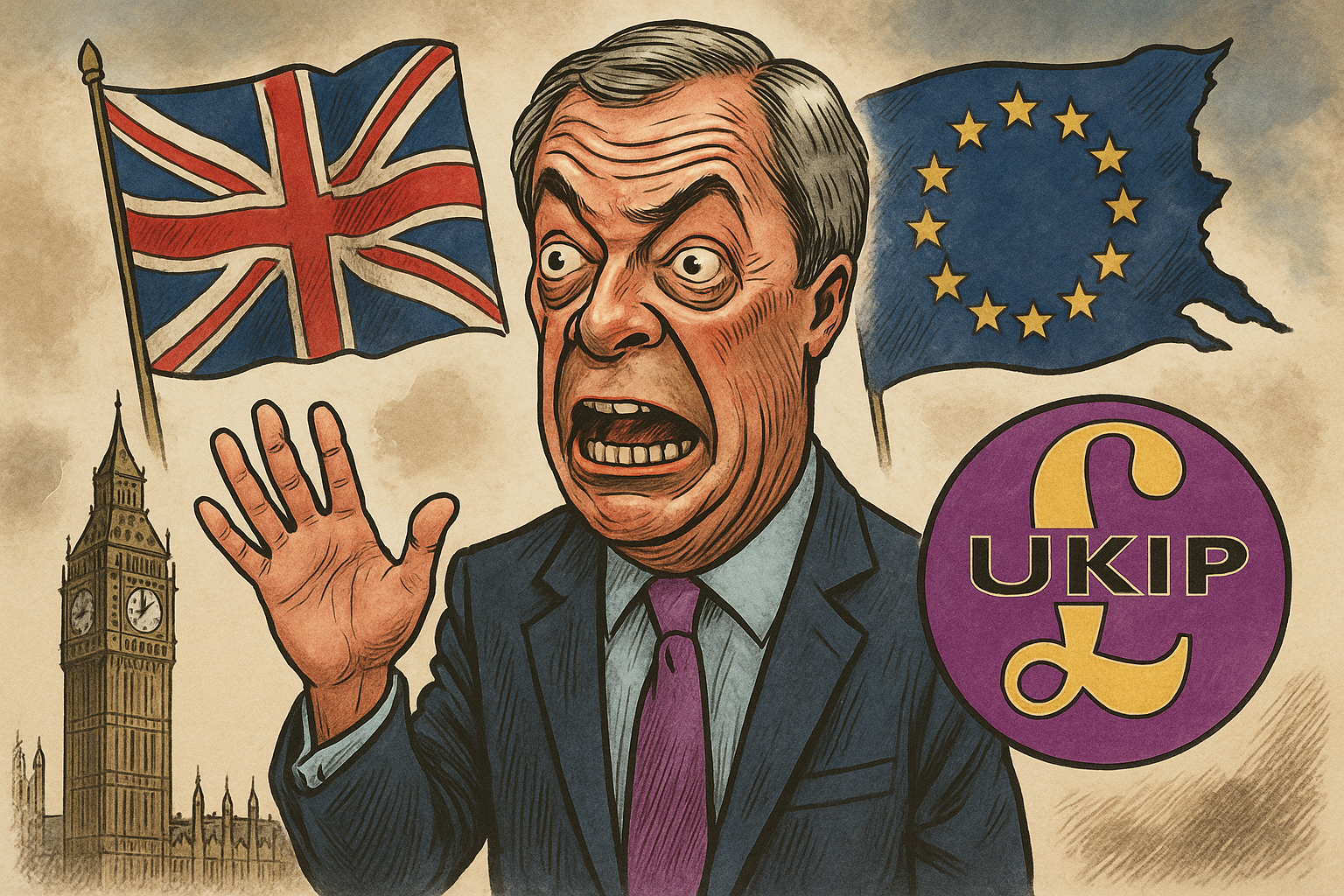
Political Career
Nigel Farage’s political career is defined not by public service, but by self-promotion, disruption, and an ongoing campaign to mainstream far-right ideas in British politics. From his early days as a Conservative defector to his current role as leader of Reform UK and Member of Parliament for Clacton, Farage has consistently used political platforms to elevate himself and undermine democratic institutions.
Nigel Farage’s Entry into Politics
Farage began his political journey in the early 1990s after leaving the Conservative Party in protest over the Maastricht Treaty. Rather than stepping away from politics, he aligned himself with the nascent UK Independence Party (UKIP), a fringe movement focused on withdrawing the UK from the European Union. It was a calculated move that allowed Farage to style himself as an anti-establishment figure while still operating within the realm of party politics.
He first stood for Parliament in 1994 and failed. Over the next two decades, he would run multiple times without success, while simultaneously building a loyal media following. Despite losing every general election he contested until 2024, Farage used his position as a Member of the European Parliament (MEP) from 1999 to 2020 to promote nationalism, anti-immigrant sentiment, and public distrust of democratic institutions.
Farage’s Role in UKIP and the Brexit Campaign
Under Farage’s leadership, UKIP shifted from a Eurosceptic pressure group to a platform for far-right ideology. He presided over an increasingly toxic party culture, including repeated scandals involving racism, misogyny, and Islamophobia among its members and candidates. Farage publicly distanced himself from the worst offenders but only after negative press coverage made doing so necessary.
During the 2016 Brexit referendum, Farage was not officially part of the Vote Leave campaign but ran a parallel effort that leaned heavily on xenophobia and disinformation. He unveiled the infamous “Breaking Point” poster, which mirrored Nazi-era propaganda, and falsely claimed that leaving the EU would free up £350 million a week for the NHS. Despite lacking an official role, Farage became the face of Brexit for millions of voters.
Nigel Farage After Brexit
Farage briefly stepped down after the Brexit vote, only to return repeatedly during UKIP’s internal collapse and the rise of new hard-right factions. He founded the Brexit Party in 2019, rebranding it as Reform UK after Brexit was formally completed. Throughout this period, he aligned himself with American far-right figures like Steve Bannon and became a vocal supporter of Donald Trump.
His political career increasingly blurred the lines between elected office and media propaganda. Farage hosted shows on GB News, used YouTube and social media to spread conspiracy theories, and positioned himself as the British counterpart to Trump-style populism.
Nigel Farage in Parliament: Reform UK and Clacton
In the 2024 general election, Farage was finally elected to Parliament, winning the Clacton seat for Reform UK. This victory came after years of claiming to represent ordinary people while never actually holding a Commons seat.
As leader of Reform UK, Farage has brought performative outrage politics into Westminster. He has used his platform to oppose climate action, question the legitimacy of COVID-19 measures, and attack multiculturalism. His party has also benefited from a wave of disillusionment with both Labour and the Conservatives, attracting voters with a mix of nostalgia, grievance, and scapegoating.
Despite this success, Farage rarely proposes serious policy solutions. His interventions in Parliament are often theatrical, designed more for social media clips than legislative impact. Reform UK’s rise under his leadership reflects not a coherent political vision, but a marketing strategy rooted in division.
The Legacy of Farage’s Political Career
Nigel Farage’s political career is built on exploiting public anger while protecting elite interests. He has never served in government, never held a ministerial post, and has left every political institution he entered more divided than before. Whether at the European Parliament, UKIP, or now Westminster, Farage’s legacy is one of chaos, not leadership.
His appeal lies in his ability to simplify complex issues into slogans and scapegoats. His danger lies in how effective that strategy remains in a political climate hungry for certainty, even if it comes at the expense of truth.
Disclaimer
This page is based on verified public information, including election records, parliamentary proceedings, and media reports. Farage Exposed is a non-commercial research project intended for public interest. While all facts are checked for accuracy, readers are encouraged to review the original sources and remain critical of all public figures.
